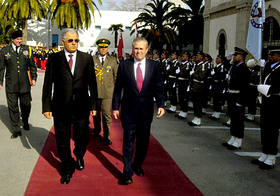|
TUNIS, Tunisia, Feb. 11, 2006 – Defense Secretary Donald H. Rumsfeld had separate meetings today with Tunisia's president, foreign affairs minister and defense minister to kick off a three-day series of visits to nations in North Africa.

Defense Secretary Donald H. Rumsfeld (right) arrives in Tunis, Tunisia, and is welcomed by Tunisian Defense Minister Kamel Morjane with military honors, Feb. 11. Photo by Petty Officer 1st Class Chad J. McNeeley, USN
(Click photo for screen-resolution image) |
|
The secretary also will visit Algeria and Morocco as he seeks to further strengthen the military relationship between the United States and what he called "longstanding friends and longtime partners." "We have a very long relationship with Tunisia," Rumsfeld said after the meetings. "Tunisia is a moderate Muslim nation that has been and is today providing very constructive leadership in the world. The struggle that's taking place within that faith is a serious one, an important one. There's a very small number of violent extremists on the one side against a broad, overwhelming majority of people who are moderate." Rumsfeld said senior leaders in the country have spoken against violence and extremism and on behalf of moderation. "They have demonstrated, if one looks at this successful country," the secretary noted, "the ability to create an environment that's hospitable to investment, to enterprise, and to opportunity for their people." Following his morning meeting with Defense Minister Kamel Morjane, Rumsfeld expressed his appreciation to the Tunisian people for helping and supporting the U. S. after the Sept. 11, 2001, terrorist attacks and in the aftermath of Hurricane Katrina last year. He noted that the U.S. Army fought some of its earliest and most difficult battles of World War II on Tunisian soil. "I've had the privilege of visiting the cemetery at Carthage," he said, "which is an impressive reminder for all of us that freedom does not come without cost, and that our nations do need to remain to protect our people." Rumsfeld cited last spring's 20th meeting of the U.S.-Tunisian joint military commission as one example of "very constructive military and diplomatic cooperation" between the two nations over the years. "Both of our countries have been attacked by violent extremists, so we know well the stakes involved in the struggle that's being waged," he said. "Tunisia has long been an important voice of moderation and tolerance in this region, and has played a key role in confronting extremists not just within this country, but in the area as well." Morjane said his meeting with Rumsfeld was "fruitful and cordial," and that their talk focused on cooperation prospects and an exchange of views about issues of common interest. "I reiterated to Mr. Rumsfeld the determination of Tunisia, in accordance with the policy orientations of President Zine El Abidine Ben Ali, to strengthen the ties of friendship and cooperation between Tunisia and the United States." According to a written statement issued by Ben Ali's spokesman after the Tunisian president met with Rumsfeld, their meeting "allowed for a review of the strong and ancient ties and friendship between Tunisia and the United States and of the means to further develop this relationship based on the determination of the two countries to promote and enhance these ties." The statement said Ben Ali emphasized Tunisia's determination to support international efforts aimed at calming the region and ensuring stability. He also expressed the hope "that current developments in Iraq will contribute to guaranteeing the territorial integrity of Iraq, allowing the latter to dedicate its efforts to the tasks of building and reconstruction." Ben Ali reaffirmed Tunisia's "unwavering stand" against terrorism and extremism, the statement continued, and called for joint efforts by the international community "to fight this scourge, which constitutes a threat to all humanity." Tunisia participates actively in the Defense Department's International Military Education Program. U.S. Embassy officials here said more than 3,600 Tunisian officers and technicians have been trained through IMET since the program's inception 20 years ago. DoD also supports Tunisia's counterterrorism program through bilateral exercises and special training courses for selected Tunisian participants and units, officials said. DoD and Tunisia's Defense Ministry also engage in personnel exchanges and military-to-military events.
|